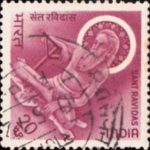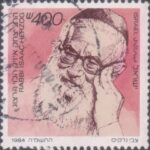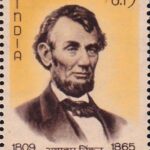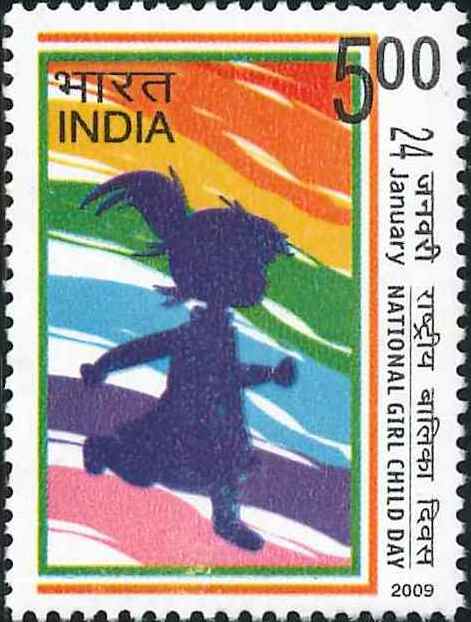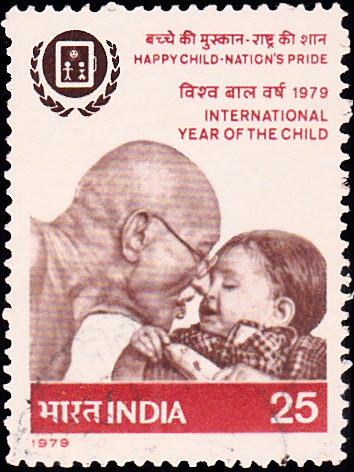
Jewish Festival 5739 : Patriarchs
Complete set of 3 nos. of postage stamps on the Jewish New Year 5739 (1978) : Hebrew Patriarchs : Abraham, Isaac and Jacob :
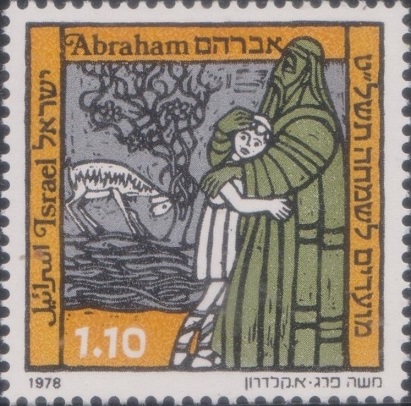
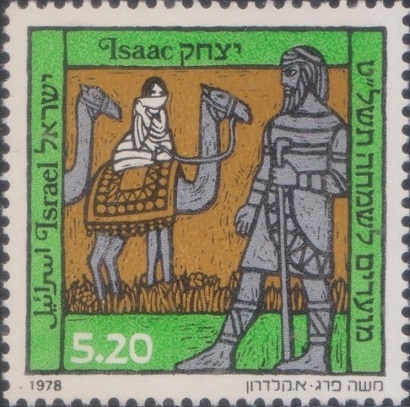
 Issued by Israel
Issued by Israel
Issued on 22 Aug, 1978
The Designer : The stamps were designed by A. Kalderon and M. Pereg, Tel Aviv
Type : Stamps, Mint Condition
Colour : Multi colour
Denomination : 1.10, 5.20 & 6.60 Pound
About :
- Abraham, first of the Hebrew Patriarchs and founder of the concept of Monotheism, was born Abram, son of Terah, in Ur of the Chaldees about 4000 years ago. He had two brothers, Haran and Nahor, and was married to his beautiful half-sister, Sarai. Haran died young, and after Haran’s death Terah, with his two striving sons and their wives, “went forth into the land of Canaan.” Here, when Abram was about 75 years old, he heard the voice of the Lord telling him, “Get thee… unto a land which I will show thee, and I will make of thee a great nation.”
- Travelling south along the Patriarch’s Way, Abram reached Shechem and “builded there an altar to the Lord,” then, continuing south, he raised a second one at Beth-El. Afterwards he settled in “the plain of Mamre which is Hebron,” and during this time, probably around 1850 BCE, Abram met with Melchizedek, king of Salem, who not only brought forth bread and wine for his guest, but also sanctified him with the “blessing of the most high God.”
- Despite his great wealth, Abram was unhappy, for Sarai was barren. Fearing her husband would be left without an heir, she gave him Hagar, her maidservant, as a proxy wife, but when Hagar conceived, Sarai became bitterly jealous. Some years later the Lord spoke again to Abram, saying, “I will establish my covenant between me and thee… and I will give unto thee and to thy seed after thee all the land of Canaan for an everlasting possession, and I will be their God.”
- Part of the bond was the changing of Abram’s name to Abraham, “a father of many nations,” and of Sarai’s to Sarah, while another was the injunction of circumcision, as a visible sign of the covenant. About the same time, in Sarah’s ninetieth year, the visiting angels prophesied that she would bear a son. In due course Isaac was born, and Sarah, afraid that Ishmael, Hagar’s child, would endanger her own son’s inheritance, persuaded Abraham, much against his will, to send Hagar and her boy away into the “wilderness of Beersheba.” However, the Lord watched over Hagar and the lad, and promised “I will make him a great nation.”
- Abraham’s faith was severely tested when a divine commandment bade him sacrifice his son Isaac – a practice common in the pagan Canaanite rites. Unwilling to disobey, Abraham took Isaac to a mountain in the land of Moriah – traditionally Mount Moriah, the Temple site – prepared a fire and bound his son for the slaughter. At the crucial moment, a voice rang out bidding him not to harm Isaac, thus wiping out the abominable ritual of child sacrifice.
- Isaac grew and prospered, and after Sarah’s death and burial at Hebron, he married Rebekah, a lovely girl from his father’s family. Abraham took another wife, Keturah, by whom he had several children. He died at the great age of 175, and was laid to rest near Sarah in the Tomb of the Patriarchs in Hebron.
- Perhaps the greatest figure in the Pentateuch, Abraham is to this today revered and respected by other religions, notably the Christian and Moslem faiths. Mentioned frequently in the New Testament as the ultimate example of obedience to God’s will, he is also accepted as the spiritual father of all believers. The Moslems, too, consider him as the formulator of Monotheism, and often refer to him as the Friend of God.
- The Patriarch Isaac, only child of Abraham and Sarah, was born when his father was 100 years old and his mother 90, well beyond normal childbearing age. His birth was an occasion for great rejoicing, for the gift of this long-awaited son was a veritable miracle. Circumcised at “eight days old, as God had commanded,” Isaac, whose name symbolizes laughter – the happy laughter of his parents – was accepted into the covenant as an infant.
- Loved by Abraham and idolized by his mother, Isaac had a sheltered childhood. Genesis 21:8 relates how “the child grew and was weaned: and Abraham made a great feast the same day.” During the festivities, Sarah noticed Ishmael, Isaac’s older brother by Hagar the maidservant, mocking the ceremony, and she insisted that Hagar and Ishmael be sent away, in order to leave Isaac as sole heir to the family heritage.
- The episode best illustrating Abraham’s profound faith in the Lord and Isaac’s complete devotion to his father was that of the divine command to give his favourite son as a burnt offering. When Isaac was about to be slain, a voice “called unto him out of heaven, and said Abraham, Abraham:… Lay not thine hand upon the lad,” thus saving Isaac’s life and also ending the heathen Canaanite rite of child sacrifice.
- On reaching maturity, Isaac settled in the south, and “sowed in that land, and received in that year a hundredfold.” – one of the earliest biblical references to planned agriculture. He did not marry until he was 40, after the death of Sarah, when a trusted servant was told by Abraham to “go unto my country and to my kindred, and take a wife unto my son Isaac.” He returned with Rebekah, Abraham’s great-niece, whom Isaac cherished for her goodness and beauty. Although Rebekah was barren for 20 years, Isaac, a gentle, kindly person – one of the few monogamous men in the Bible – remained constant to her.
- Eventually, when the family were still living in the Negev region, Rebekah bore twin boys, “the first came out red, all over like a hairy garment; and they called his name Esau, and after came his brother out… and his name was called Jacob.” Different in temperament as in looks, Esau the hunter was his father’s pet, while handsome, smooth-skinned Jacob, destined to be the third patriarch, was preferred by his mother. Genesis 27 tells how the blind and aged Isaac decided to pass on his divine blessing to Esau, and how by a stratagem Jacob, aided by Rebekah, disguised himself as the senior twin and received the paternal benediction.
- Isaac lived for another 20 years after this strange incident, dying in Hebron at the ripe age of 180. “His sons Esau and Jacob buried him,” in the Tomb of Patriarchs in the Cave of Machpelah, the sepulchre of the parents, Abraham and Sarah, and of Rebekah his wife.
- Christian and Moslem traditions both honour Isaac as a righteous and peace-loving man. In the New Testament he is referred to as “a child of promise” and Abraham’s true heir, while Islam declares that Isaac as well as Abraham were prophets.
- Jacob, third of the Patriarchs and father of the Twelve Tribes, was the younger twin son of Isaac and Rebekah. Little is known of the early years of Jacob or his brother Esau, but as they grew to manhood, Esau became “a hunter, a man of the field; and Jacob was a plain man, dwelling in tents. And Isaac loved Esau because he did eat of his venison: but Rebekah loved Jacob.”
- The Bible story tells how Esau sold his birthright to Jacob for “bread and pottage of lentils.” Partly as a result of this transaction, when the blind Isaac felt death approaching and wanted to bless his older son, the younger one, Jacob, with his mother’s aid, disguised himself as the hairy Esau and obtained the paternal blessing. Fearing Esau’s anger, and at the same time seeking a bride from among his own kin, Jacob, already 77 years old, fled northward. He rested at Beth-El, where “he dreamed, and behold a ladder set up on the earth, and the top of it reached heaven.” Above the ladder stood the Lord, who reconfirmed the promise of the Covenant.
- Arriving at his uncle Laban’s household, he met Rachel, the family’s younger daughter, and immediately asked for her hand. Laban agreed, provided that Jacob, who could not pay the customary brideprice, would serve him for seven years. On the wedding night, Jacob found he had been given Leah, Rachel’s older, plainer sister to wife. Enraged at this deception, Jacob was told it was forbidden “to give the younger before the firstborn,” and he agreed to work another seven years for Rachel.
- Leah was fruitful and bore Jacob six sons and a daughter, while the two handmaids, Bilhah and Zilpah, bore him two sons each. Only Rachel was barren, but after many years she gave birth to Joseph. Following Joseph’s birth, Jacob decided to return to his homeland, and the whole company set out towards the south.
- At Peniel Jacob encountered an angel who “wrestled with him until the breaking of the day,” but was unable to overcome Jacob, although he “touched the hollow of his thigh… and it was out of joint.” Before Jacob released him, the angel blessed Jacob and renamed him “Israel,” – “you have striven with God.”
- Rachel was then in her second pregnancy, and as the caravan continued its journey, it stopped at Ephrath, near Bethlehem, where she died giving birth to Benjamin. Finally Jacob came to Mamre, or Hebron, where Isaac was still living and, having attained the great age of 180, he died, “and his sons Esau and Jacob buried him” in the ancestral grave.
- The rest of Jacob’s life was closely interwoven with that of Joseph, the child of Jacob’s declining years. Envied by his brothers because he was his father’s favourite, Joseph was sold into slavery in Egypt, but soon rose to be an influential courtier. Welcoming his brothers when, pressed by famine, they came to Egypt to buy corn, he demanded they should bring with them Benjamin, beloved Rachel’s younger son, who was jealously guarded by his father. Eventually Jacob himself came to Egypt and died there when he was 130, having first made Joseph vow to “carry me out of Egypt, and bring me in the burying place of my forefathers.”
- Sylvia Mann
Subscribe
Login
0 Comments
Oldest


